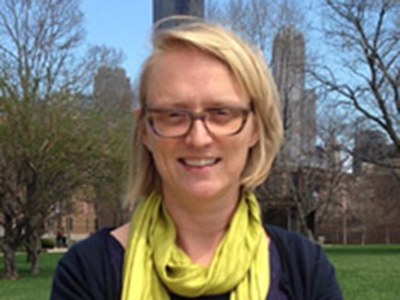Mapping the Humanities Q&A
 Lara Kelland
Lara Kelland
Department of History
2016-17 Commonwealth Center for the Humanities & Society Faculty Fellow>
What is your role as a CCHS Faculty Fellow?
I see my role this year as being a delegate from my department to A&S. The CCHS is tasked with promoting a research culture across the college, and I am honored to play a part in that by promoting events and helping to cultivate the exchange of ideas between faculty, students, departments, and the larger Louisville community.
What is the role, and importance, of an "intellectual community" such as this in A&S? As scholars, and as part of the wider university community?
For me, this kind of intellectual community is invaluable. As a scholar, I work best when I can exchange ideas with others, and having an opportunity to work closely with brilliant folks from other fields is extremely fruitful. I trust that these relationships will feed us and our departments for years to come.
There are a variety of interests and academic disciplines represented in the program. How will working among such a diverse group elevate your own research? What are the benefits of participating in a community of diverse scholars such as this?
This group is returning me to my interdisciplinary roots, and I love it. Having been trained at the undergraduate and master's levels in discipline-crossing programs, I feel like I have returned to the dynamic kind of intellectual exchange I once knew.
What does "mapping the humanities" mean to you?
For this year, I am focusing on geospatial digital mapping using data from the Parkland History Project and the Anne Braden Institute's civil rights movement driving tour. I will compare different open-source or easily accessible mapping platforms to research questions of civic engagement and the representations of public memory.
I also think the theme has methodological significance, as we fellows are acting as representatives of our respective fields. Maps convey relationships, and the fellows are exploring commonalities and contrasts between our disciplines.
What inspired/s you to work in your particular academic field?
I have always been interested in the ways in which we come to know, understand, and imagine the past. Public History as a field allows me to combine this research inquiry with the practices of engaged scholarship and community collaborations. As a public historian, I understand my role as one of facilitation, promoting an exchange between historical scholarship and popular conceptions of the past.
I also believe in the importance of understanding the past as we envision the future, a task that is becoming increasingly relevant in our country and our world.
